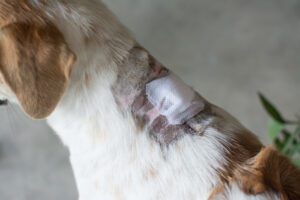10 Common Pet Emergencies in Langhorne, PA
When it comes to our pets, emergencies can happen at any time, and knowing what to do can go a long way toward ensuring a smooth recovery. This blog is here to help you understand the common pet emergencies vets see in Langhorne, PA, and how our team at Pets Furst Urgent Care can assist you. If you ever find yourself in a situation where your pet needs immediate attention, calling Pets Furst Urgent Care at (215) 755-1000 is the best first step. Our doors are open 7 days a week and we offer a wide range of services from emergency and urgent care to wellness, vaccinations, microchipping, and diagnostics. We are here to support you and your pet, ensuring they receive the care they need when they need it most.

1. Eating Something Harmful
Pets are curious by nature, which sometimes leads them to eat things they shouldn’t! From household toxins like rat poison or antifreeze to toxic foods such as grapes, onions, or xylitol-containing products for dogs, and lilies for cats, the range of dangerous items is vast.
Symptoms of poisoning can vary widely but may include vomiting, diarrhea, lethargy, and seizures. Quick action can be critical. If you suspect your pet has ingested something harmful, try to identify what it was and how much they consumed, as this information can be crucial for treatment. Calling Pets Furst Urgent Care right away can provide you with the next steps to take, including whether to bring your pet in for emergency care.
2. Car Accident Injuries
Car accidents are traumatic events that can lead to fractures, internal injuries, or even shock in pets. Signs of injury may not always be immediately apparent, as adrenaline can mask pain and discomfort. Therefore, even if your pet seems fine after an escape and encounter with a vehicle, it’s important to have them examined as soon as possible. At Pets Furst Urgent Care, we have the equipment and expertise to assess and treat injuries from car accidents, focusing on pain management and recovery.
3. Fight Wounds and Bites
When pets fight, the resulting bite wounds can be more dangerous than they appear, with risks of deep tissue damage and painful abscesses caused by infection. Cats especially are prone to developing abscesses from bite wounds. A veterinarian will need to clean the wounds and possibly administer antibiotics. Our team is experienced in treating bite wounds, providing care that minimizes infection risk and promotes healing.
4. Allergic Reactions
Allergic reactions in pets can escalate quickly and may become life-threatening. Swelling of the face, hives, and sudden onset of vomiting or diarrhea are common signs. In severe cases, pets may experience anaphylaxis, a critical reaction that demands prompt veterinary intervention. Our urgent care facility is prepared to administer antihistamines, steroids, or epinephrine, depending on the severity of the reaction, and provide supportive care as needed.
5. Severe Vomiting or Diarrhea
Frequent vomiting or diarrhea can lead to dehydration, electrolyte imbalances, and weakness. These symptoms can be caused by infections, dietary indiscretion, or more serious underlying conditions. We focus on hydration and diagnosing the cause of the symptoms, and can perform diagnostic tests such as bloodwork and X-rays to get to the root of the problem and tailor treatment to your pet’s specific needs.
6. Difficulty Breathing
Difficulty breathing can be a symptom of heart failure, asthma, pneumonia, or even a foreign object lodged in the throat. This situation requires immediate veterinary care. Our team is equipped to provide oxygen therapy, perform X-rays, and undertake emergency procedures if necessary. We prioritize stabilizing your pet’s condition and providing comprehensive care to address the cause of their breathing difficulty.
7. Sudden Collapse or Weakness
A pet that suddenly collapses or shows extreme weakness may be experiencing a critical emergency, such as internal bleeding, cardiac issues, or metabolic diseases. These conditions can deteriorate rapidly, so you should take your pet to the vet right away for treatment and monitoring.
8. Seizures
Seizures in pets can be caused by epilepsy, toxins, liver disease, or brain tumors, among other things. When a pet has a seizure, it is usually characterized, by stiffening of the limbs, paddling of the legs, twitching, loss of bodily functions, and drooling. During a seizure, it’s important to keep your pet safe and away from any objects that could harm them. After the seizure, keeping them calm and comfortable is key.
9. High Fever
A high fever can indicate an infection or other serious health issue. Pets with a fever might be lethargic, have a reduced appetite, and show signs of discomfort. Because fever is a symptom rather than a disease, our approach includes identifying and treating the underlying cause.
10. Eye Injuries
Eye injuries can vary from simple scratches to deep ulcers or foreign bodies lodged in the eye. Symptoms such as squinting, tearing, or pawing at the eye indicate that something is wrong. Prompt treatment is essential to prevent complications, including vision loss. Our team at Pets Furst Urgent Care has the expertise to treat eye injuries, ensuring the best possible outcome for your pet’s vision and comfort.
Does Your Pet Have an Urgent Problem? We’re Here for You
At Pets Furst Urgent Care, we understand that emergencies and urgent situations can be stressful for you and your pet. Our facility in Langhorne, PA, is equipped to handle a wide range of issues with compassion and expertise. We’re here to provide the care your pet needs, when they need it most. We look forward to serving our community’s pets with emergency and urgent care, wellness services, vaccinations, microchipping, and diagnostics. Call us at (215) 755-1000 for more information or to see one of our vets.
recent posts
About Us
At Pets Furst Urgent Care, your time is important to us. That’s why we’re here: To provide the highest level of pet urgent care possible on a walk-in basis. That means you can stop in at any time during our office hours to see a knowledgeable veterinarian.

